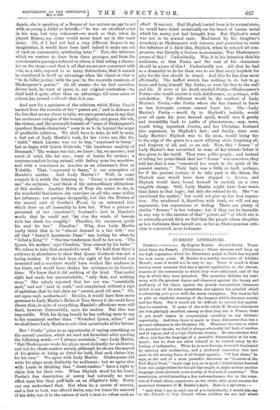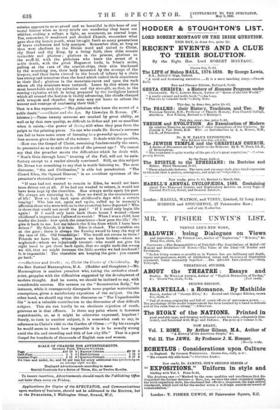CURRENT LITERATURE.
SERNIONS.—Sermons. By Eugene Horsier. Second Series. Trans- lated from the French. (Dickinson.)—These sermons well keep up the high reputation which the Protestant pulpit in Paris has enjoyed for now many years. M. Bersier is a worthy successor of Adolphe Monod ; more it would not be easy to say. There is much in these twenty-seven sermons that has a special application to the circum- stances of the community to which they were addressed, and of the city in which they were preached. The preacher delivers his testi- mony with the greatest vigour and clearness against the luxury and profligacy of his times, against the grossly materialistic literature which is one of its worst symptoms, and against the unbelief which is advancing part passu with the moral corruption. Nor does he fail to give an emphatic warning of the dangers which threaten society and the State. Bat it would not be difficult to extend this applica- tion to ourselves. If some of the evils which M. Bersier denounces are less glaringly manifest among us than they are in France, there is yet small reason to congratulate ourselves on any intrinsic superiority. And then there is much in these discourses that has a general reference to the Christian life. Whatever the tone in which the preacher speaks, we find it always admirably full both of wisdom and of vigour, and of a high Christian charity. He uses sarcasm with effect, and has the language of a powerful denunciation at his com- mand; but he does not allow himself to be carried away by the feeling of indignation. When he is most fervent, he is still dominated by sobriety and moderation, and a profound conviction that love must be the moving force of all Gospel appeals. "If fear alone," he says, at the end of a most powerful discourse on "Lazarus at the Rich Man's Door," "must urge you on to good, I would rather descend from this pulpit where the Gospel has sought to make us hear another language, more elevated, more worthy of God and of ourselves." This translation, notwithstanding a few awkwardnesses due to the reten- tion of French idiom, represents, on the whole, with great st1C013011 the oratorical character of M. Bersier's style. Here is a specimen :—
" And what I say to each one of you individually, I would also-aay to the Church, to that Church whose children we are, and whine
mission appears to us so grand and so beautiful in this hour of our moral history when so many minds are wandering they know not whither, seeking a refuge, a light, an assurance, an eternal hope. Yes, remember, 0 weakened and divided Church, remember what gave thee thy heroic youth, what brcught forth so many generations of brave confessors and holy martyrs. Remember that, so long as thou wert obedient to the Divine word and united to Christ, thy Head and thy King, by a living faith, thou didst remain invincible and glorious ; glorious in the prisons, glorious on the scaffold, with the plebeians who knew the secret of a noble death, w:th the great Huguenot lords, in felon's attire, palling at the cars of the convict-ships, their skin blackened by the scorching son, their body lacerated by the scourge of the keepers, and their limbs riveted to the bench of infamy by a chain less strong and tenacious than the bond which united their conscience to their God ; glorious in the mountain-caves and upon the rack where oft thy ministers were tortured. Learn by this where thou must henceforth seek thy salvation and thy strength, so that, in the coming explosion which is being prepared by the irreligious hatred which all around the horizon is visibly advancing, like clouds charged with tempest and thunder, tby Bons may not leave to others the honour and courage of confessing their God."
That is a fine expression,—" The plebeians who knew the secret of a noble death."—Christ and the Age. By Llewelyn D. Bevan. (W. Isbister.)—These twenty sermons are marked by great ability, as well as by that rare quality, so difficult to define and yet so manifest when it exists,—the power of living still when they pass from the pulpit to the printing-press. No one who reads Dr. Seven's sermons can fail to have some sense of listening to a powerful speaker. The first sermon gives the note of the volume. It deals with the question, —How can the Gospel of Christ, remaining fundamentally the same, be presented so as to suit the needs of the present age ? We cannot say that the preacher meets the difficulties which be deals with. "Man's Gain through Loss," treating of the Fall, will not be satis- factory except to a reader already convinced. Still, on this subject Dr. Bevan has something to say that is worth listening to. The next discourse, "Sin and Civilisation," is able but paradoxical. "The Closed Eden, the Opened Heaven," is an excellent specimen of the preacher's rhetorical power
"If man had not wanted to remain in Eden, he would not have been driven out at all. If he had not wanted to return, it would not have been kept by the cherubim. Man always seeks again his past. We always are returning to it. How we dwell in the reminiscences of life ! How we look back upon childhood's days with a certain longing ! Who has not, again and again, called up in memory's affection those who were with us in the years that have departed ? Who is there that would not recall the past ? 'If I could only begin life again ! If I could only have back those hours I wasted—those childhood's impressions I allowed to vanish ! When I was a child, how tender the heart--how quick the conscience—how pure the lire! Oh! give it back to me. Let me inherit the E len from which I have been driven !' My friends, it is vain. Eden is closed. The cherubim are at the gate ; there is always the flaming sword to keep the way of the tree of life. Old friendships ! Who would not return to these ? Friends we have lost, whose hearts we have broken—whom we neglected—whom we injuriously, treated—who would not give his right hand to get them back again, that we might undo the wrong we did, that we might increase the littla service we bad rendered ? It is impossible ! The cherubim are keeping the gate : you cannot go back."
—Doctrine and Doubt ; or, Christ the Centre of Chridianity. By the Rev. Samuel Macnanghton, M.A. (Hodder and Stoughton.)—Mr. Macnaughton is another preacher who, taking the orthodox stand- point, grapples with the difficulties suggested by the development of modern thought. And he meets, we should be inclined to say, with considerable success. His sermon en the " Resurrection Body," for instance, while it courageously disregards some popular materialistic conceptions, gives a satisfactory exposition of the suhject. On the other band, we should say that the discourse on "The Unpardonable Sin" is not a valuable contribution to the discussion of that difficult subject. This sin can hardly be an obstinate rejection of truth, grievous as is that offence. Is there any point where it becomes unpardonable, or, as it might be otherwise expressed, hopeless ? Surely, to turn to another subject, it is somewhat rash to say, in reference to Christ's visit to the Garden of Olives :—" By his example he would seem to teach how impossible it is to be morally strong amid the din and crowding and filth of low city life." That is a poor Gospel for hundreds of thousands of English men and women.















































 Previous page
Previous page